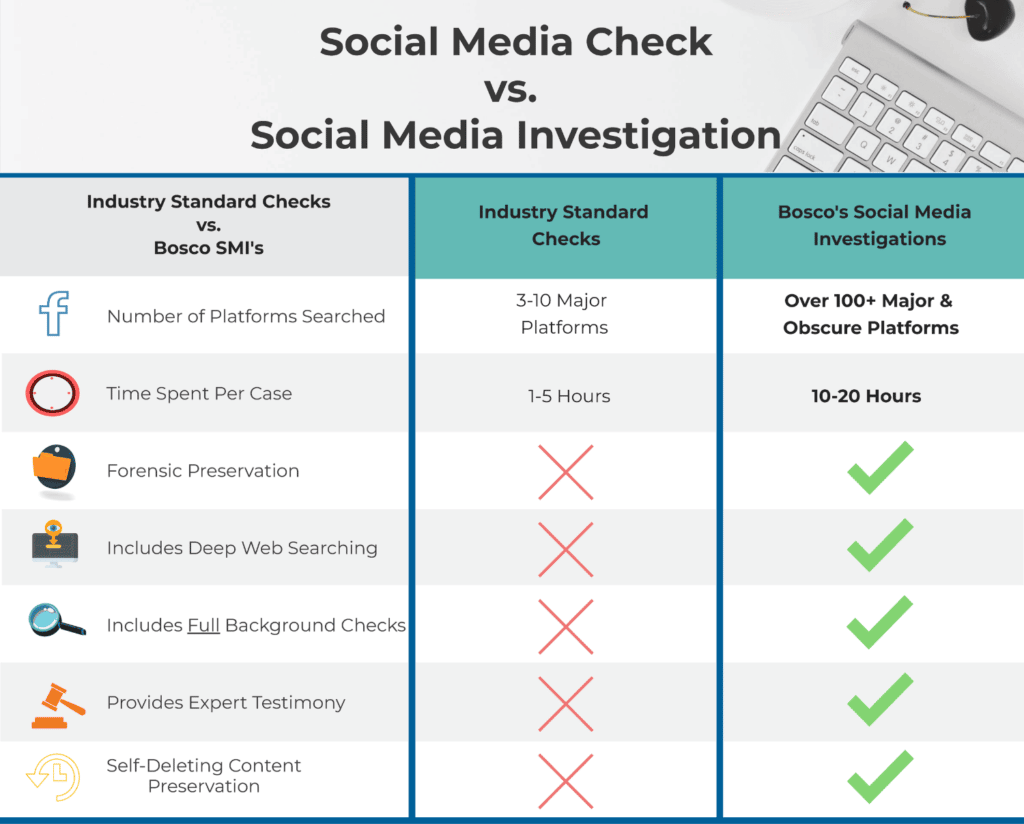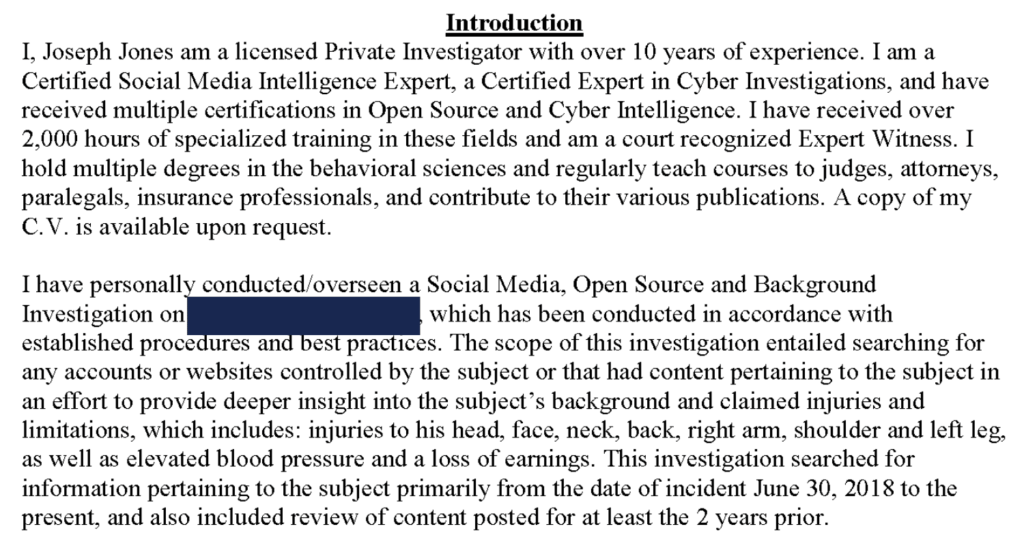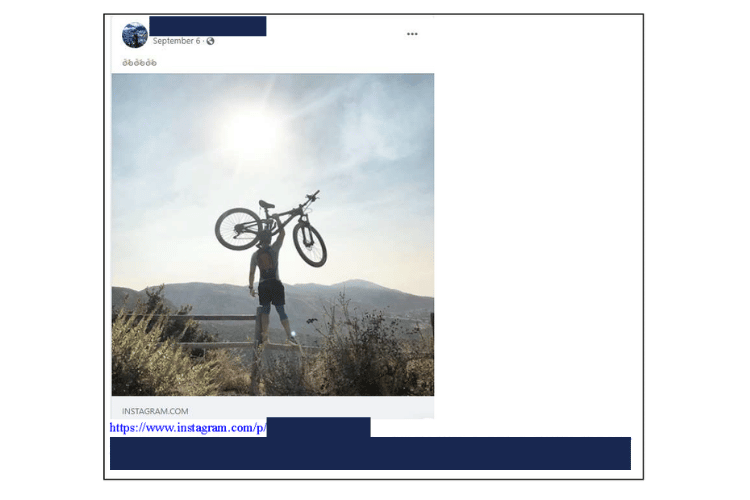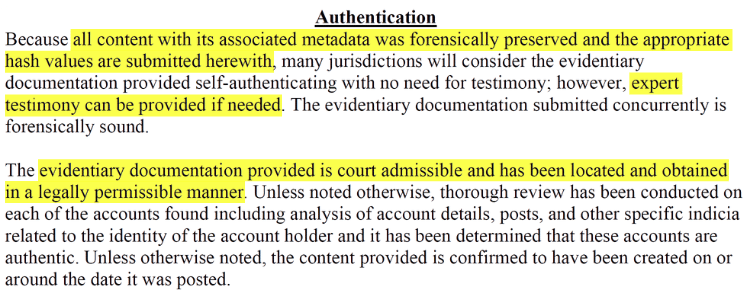If social media activity is crucial to your argument in court, how will you make sure that you’re putting forth the strongest case possible? Before handing over the reins to your legal team, take a moment to verify how they’ll be gathering and processing critical evidence. Will they be using a software service or engaging a professionally trained social media investigator? The first option may save you a little money upfront – but ultimately cost you your case.
For the purposes of this article, when we refer to social media software or tools, we’re referring not only to the reports that these systems produce, but also to the major role that they play in the large majority of social media investigation reports that traditional private investigation agencies use when providing SMI services to their clients, and how that compares to using experienced social media investigators, who physically conduct a thorough investigation.
What Is a Social Media Investigator?
A social media investigator is an individual who specializes in gathering, documenting, and analyzing social media activity to present as evidence in court. These investigators are experts in the laws that dictate the admissibility of social media evidence, and the nuanced process of social media intelligence gathering. By using a variety of advanced tools and techniques, an investigator will locate, preserve, and organize all posts, videos, stories, profiles, and more that may be relevant to your case. This investigator or investigative team will then be able to testify to the authenticity and relevance of the social media evidence in court.
How Does Social Media Software Compare to an Investigator?
On the surface, an automated social media software may appear to do the same job as an investigator. In the end, software can provide you with (some) information, but a trained investigative team can provide you with intelligence. Let’s break down the vital differences between these two approaches to a social media investigation.
How Legal Teams Use Automated Social Media Software
If a legal team uses social media software and/or databases to conduct an investigation, there is typically some human involvement in evidence gathering – but not much. SMI software scans certain social media platforms for profile information (like names, posts, photos, and geolocation) and then spits out a database report.
After the software creates a report, someone will generally spend about 1-2 hours reviewing what the database provided and then pass it along to the client. So, what’s the problem here? Social media software has serious limitations in what kinds of evidence it can gather, and you’re likely to run into issues backing up your claims once you get to court. In short: software provides less robust and valuable information than a professionally trained social media investigator and even if the software report finds something valuable, it likely can’t be used in court.
How Private Investigators Check Social Media for Evidence
A private social media investigator or investigative team will comb through virtually all social media platforms to identify, document, and preserve evidence relevant to a case. This means finding every profile, reading every post, identifying connected profiles (like those of friends, family, and employers) that could contain additional evidence, and taking the search beyond social media platforms and into the deep web. These investigators use search and documentation methods designed to prevent spoliation of evidence and guarantee that you can use social media content in your case. They are also able to testify to those methods in court – something that software can never do.
Data vs. Analysis
Software gives you data and investigators give you analysis. Investigators who conduct their own in-depth social media searches can provide relevance, context, and meaning for the evidence they gathered – and software will likely give you none of this.
Here’s a quick rundown of why automated social media software tools just can’t do the job of a professional investigator:
- Data quality and relevancy are often worse when using software tools, due to database gaps and algorithm limitations. They’re also unable to perform additional tasks like thorough background checks and deep web searches.
- Self-deleting content, like Snaps (from Snapchat) and Stories (from Facebook and Instagram), can’t usually be preserved by social media software tools. This has been an especially detrimental limitation since 2019 when posts of stories started outpacing more traditional posts. Professionally trained investigators can access and preserve these potentially case-changing pieces of evidence.
- Forensic preservation of evidence can only be done correctly by professional investigators. If evidence isn’t properly preserved, it’s likely to be inadmissible and useless for your case.
- Robust analysis comes from real time spent considering your case. Legal teams, including the majority of private investigation companies, who are relying on software databases may spend an hour or two reviewing social media content, while a professionally trained social media investigator will usually spend 10-20 hours conducting investigative research and analysis.
- Testimony in front of a judge or jury can be critical for defending your evidence gathering methods and use of social media evidence in court. Computers can’t ever get on the stand and neither can the person that simply reviewed their report.
Case Study: SMI Software vs. SMI Investigator
Let’s get a real-life look at how a social media software driven report compares to the intelligence gathered by a professionally trained social media investigative team. Note that this case study is shared with the consent of the client and certain information has been redacted.
In this case, the plaintiff claimed that they had sustained significant injuries following an incident that had occurred 2 years prior to this litigation. They argued that these injuries had significantly impacted their quality of life, and demanded a large settlement from the defendant. The insurance company sought to validate or invalidate these claims by investigating the plaintiff’s social media activity. The insurance company first hired a traditional investigative agency whose process relied on the aforementioned SMI software’s and did in fact find a few items that appeared significant and thought they had strong evidence “in their back pocket”.
As the case moved deeper into litigation and closer to trial, the handling attorney (who had experience dealing with social media evidence in court) had serious concerns about the validity and admissibility of what the prior report showed and turned to a Bosco Legal social media investigator for secondary analysis. How did the reports compare? Let’s see:
Comparison of Introductory Statements from a Competitor vs. Bosco Legal Services
Sample of Competitor’s Social Media Report Introduction
Sample of Bosco Legal’s Social Media Report Introduction
The primary issue here is not as much about what’s in the report, as it is with what happens when this investigation becomes relevant at trial. As previously discussed, database reports cannot provide testimony. Likewise, neither can the attorneys, paralegals or insurance adjusters who review said database reports, and the lack of having someone to testify about the evidence collected is easy grounds for exclusion at trial.
Instagram Stories
Although the software driven SMI did locate an Instagram account, notably absent was any mention of Instagram Stories, which these types of databases traditionally struggle locating/capturing content from. As previously mentioned, “Stories” are a function that many social media platforms utilize and since 2019, have become the most popular form of sharing content on social media. Not being able to capture this content can be absolutely detrimental to conducting a thorough investigation.
To illustrate the value of Stories, below is a summary of what Bosco’s Social Media Investigation team located from Instagram Stories in this particular case. As you’ll see, 72 items of critical importance to the case were completely overlooked by the database driven investigation.
Sample of Competitor’s Findings on Instagram Stories
None
Sample of Bosco Legal’s Findings on Instagram Stories
Preservation and Presentation of Posts
Below are 2 copies of the exact same post, which appeared in both reports. At first glance, they make look similar enough; however, there are a few critical differences, because the software driven report has:
- No forensic preservation of evidence to prevent spoliation.
- No metadata or hashing to meet to meet the court’s requirements for admissibility.
- Missing dates from the post. As you can see in the Instagram posts compared below, the screenshot from the database driven report only shows “September 6”, with no year. If presented in court, the lack of year would be easy grounds for exclusion from evidence, because even at face value, the date of the posting can’t be established. In contrast, the same Instagram post provided by the Bosco team of investigators shows the full date posted, as well as additional data.
- Learn more about the correct process for dating social media photos and videos here.
- Missing Comments/context, which often contains crucial evidence.
Sample of Competitor’s Findings of Instagram Post
Sample of Bosco Legal’s Findings of Instagram Post
Videos
If a picture is worth 1,000 words; a video is worth 10,000. It is extremely common that videos accompany social media posts; however, database driven reports notoriously struggle to preserve and/or are unable to provide video captures. Sure, they may include links; however, if the video gets deleted, the link no longer works and the video is lost. True to form, in this case, the database driven report produced 0 videos, while Bosco’s report provided 48 videos.
Comparison of Final Statements from the Competitor and Bosco
Competitor’s Social Media Report Conclusion
Bosco Legal’s Social Media Report Conclusion
Notice any differences? Let’s start with the obvious: the disclaimer at the end of the software report. The software driven SMI report states that “The Company does not warrant the accuracy and completeness of such information.” Essentially: we don’t know if this information is true or usable. This is a major red flag, and even if the information is true, that statement almost certainly means that the court will deem this evidence inadmissible. You must be able to establish the authenticity of social media content to use it as evidence. Conversely, Bosco’s report outlines specifics on why their report is relevant, how the accounts were authenticated and preserved, and how they are willing to stand behind their findings with expert testimony if needed.
After reviewing both reports, the defendant used Bosco Legal’s investigation to successfully show that the plaintiff was not suffering from as significant of injuries as he had claimed, and ultimately the case was settled for a reasonable amount. If the defendant only had access to the software driven investigative team’s report, there’s a good chance that they would have not had the same result. Additionally, had the case actually gone to trial and they planned on utilizing the database driven report, the results would have been disastrous, as the evidence that appeared to be significant, would have likely been excluded.
Using an Investigator for Social Media Intelligence Gathering
The complexities of preparing social media content for use in court can cause some to avoid attempting to use social media evidence at all. Indeed, it’s often not as easy as running a quick database check with a cheap software tool – but that’s not the end of the story. Professional investigators can provide invaluable assistance in winning your case, and they are often your best chance at success in court.
Reach out to Bosco Legal Services today to find out more about our social media investigation services, or take a look at these additional case studies to learn more about the role social media could play in winning your case.












